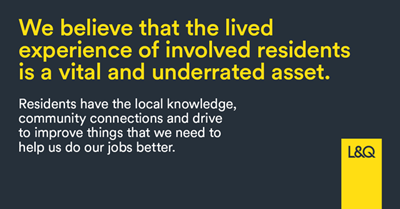Spotlight on volunteers: Meet Malcolm
People who are blind or partially sighted have skills to offer that are invaluable to a social landlord.
Social housing, more than any other tenure, is where disabled people live. Some 54% of housing association residents have a long-term illness or impairment and 18% of new lettings are to someone with a defined disability.
At L&Q, we benefit from the talents and expertise of disabled colleagues and volunteers in many areas of the business, from construction and project management to resident involvement.
Take Development Manager, Felix Lynn, for example. When visiting a construction site, Felix noticed the cabinets in the kitchens were only 500mm above the cooker hood.

From his experience living with a visual impairment, he knew this could be hazardous for others with reduced vision, and he advised our contractors to change the policy and increase the standard height.
Similarly, when he spotted doorways and cabinets protruding at an accessible home, he flagged this as an issue with his line manager.
Since introducing a volunteer management approach, we’ve been able to offer residents new ways of getting involved that are more relevant, inclusive and accessible.
This has helped us reach more people, those with circumstances that may have prevented them from getting involved previously.
A THT resident since 2008, Malcolm had wanted to take part in a resident involvement activity for a while, but his visual impairment meant that many of the face-to-face options, including estate walkarounds, weren’t suitable for him.
When an opportunity arose to help out with the recruitment for a role within our major works team, not only did Malcolm sign up, but he also stepped in to review extra assessments when another volunteer pulled out last minute.
“Stuff like this where I can sit in front of the computer is perfect. 10 minutes of my time is nothing. Estate visits are no good for me, but things that I can do at home are easy to fit into my day.
“We (the involved residents) were sent applicant responses to a fictional complaint and were asked to mark their performance against a set of criteria: tone of voice and communication skills, empathy and care for residents and demonstration of L&Q values. The example used revolved around delays to kitchen and bathroom works and contractors not showing up for pre-arranged visits.
For each written response, resident volunteers had to decide whether the candidate ‘did not meet expectations’, ‘partially met expectations’, ‘met expectations’ or ‘exceeded expectations’.
“I was looking for examples of empathy and compassion, not just a technical letter that listed the actions a candidate would take. From my own experience, I’ve found the worst response you can get is ‘This is nothing to do with my job. I can’t do this because the policy won’t allow for it.”
To make the opportunity accessible, Malcolm gave his feedback over the phone rather than via the online form.
Even though the Customer Relations Manager role was based in the South East, Malcolm believes taking part will have an impact on services in other areas.
“Services have got to get better, and so does the relationship L&Q has with its residents. I hope that the lessons taken from this exercise, as well as the approach itself, will influence recruitment in the North West."